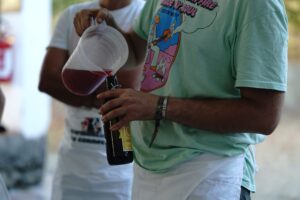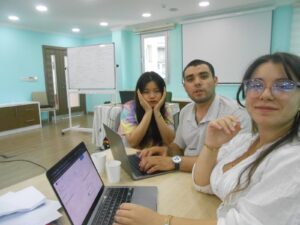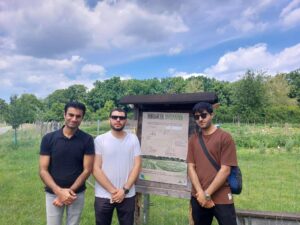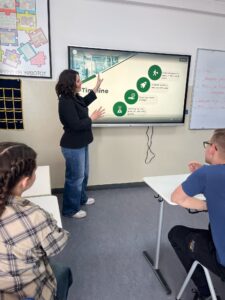I’m Nicolò Michelini, 32 years old, and in recent years I’ve been transforming a deep passion—fermentation—into something that could become a meaningful business. My journey is filled with bubbling jars, evolving flavors, and constant learning, but also with practical questions about how to make this ancient craft a modern tool for tackling urgent challenges: food waste, the recovery of surplus produce, and the creation of more local, sustainable economic models.
Experimentation has been at the heart of it all. Through a prototype food cooperative I’m part of, I’ve been exploring how to turn leftover fruits and vegetables into vibrant, living foods: kimchi, sauerkraut, kombucha, and other probiotic creations that nourish both body and taste. But a crucial question soon emerged: how do you move from micro-scale passion projects to a replicable, sustainable, and potentially scalable model?
fruits and vegetables into vibrant, living foods: kimchi, sauerkraut, kombucha, and other probiotic creations that nourish both body and taste. But a crucial question soon emerged: how do you move from micro-scale passion projects to a replicable, sustainable, and potentially scalable model?
That question began to find answers thanks to FoodBack, a multi-phase project on food and entrepreneurship developed by Kora. It has been a cornerstone in the evolution of my business idea. First, I participated in a training course on business design using permaculture principles, where we explored how to build ventures that are not only sustainable, but regenerative—deeply rooted in natural cycles, resilience, and care for people and the planet. Then, I took part in a second training, which brought us deeper into the nuts and bolts of business modeling, pushing us to refine our ideas, test our assumptions, and structure our visions with clarity. Finally, as the third phase of this path, I was selected for a job shadowing at La Buona Terra, where I could finally move from theory to practice.
La Buona Terra, a farm and educational hub, became the perfect ground for this transition. The farm’s kitchen turned into our fermentation workshop. Together with Denes and the team, we transformed “imperfect” produce—oversized zucchinis, crooked carrots, slightly wilted cabbage—into something entirely new. This wasn’t just about recipes; it was about designing systems. Every step, from the weight of ingredients to fermentation timelines, from yields to taste feedback, was carefully tracked. For example, 5kg of discarded cabbage leaves became 15 jars of sauerkraut—enough to enrich the meals of over 50 guests. The numbers told a compelling story: fermentation isn’t just a tradition; it’s a smart logistics tool, a circular economy practice, and a deeply ecological method of preserving abundance.
What struck me most was how naturally this process fit into the daily rhythm of the farm. Mornings began in the fields, selecting and harvesting; afternoons shifted to cutting, salting, packing, and documenting. Every phase flowed organically with the needs of the land and the kitchen, showing me how fermentation could become a seamless part of farm life—not an add-on, but a continuation.
 Another key part of my job-shadowing experience involved working with Joe, the organization’s coordinator, to dive into the financial side of sustainable food production. We explored cost structures, ingredient sourcing, labor hours, and the economics behind running a small-scale food business that remains rooted in ecological and ethical values. Where I used to see only bubbling jars, I began to see spreadsheets too. I realized that even the most poetic of food visions needs operational clarity and financial resilience if it’s to truly thrive.
Another key part of my job-shadowing experience involved working with Joe, the organization’s coordinator, to dive into the financial side of sustainable food production. We explored cost structures, ingredient sourcing, labor hours, and the economics behind running a small-scale food business that remains rooted in ecological and ethical values. Where I used to see only bubbling jars, I began to see spreadsheets too. I realized that even the most poetic of food visions needs operational clarity and financial resilience if it’s to truly thrive.
But one of the most unexpected gifts of La Buona Terra was the educational insight I gained. The farm regularly hosts Erasmus+ volunteers and training programs, making it a vibrant place for non-formal learning. Watching and participating in these workshops, I began to see how fermentation could also become a tool for community engagement, cultural exchange, and experiential learning. I took note of how games, stories, group activities, and informal reflection moments were used to enrich the experience, and I began to reimagine how I might design fermentation courses that go beyond technique—courses that build community, awaken food memories, and empower people with practical skills.
That’s why one of the future branches of my business will involve workshops and fermentation classes, not only as a source of income but as a way to share knowledge, reconnect people with natural processes, and help reweave local food cultures.
When I left La Buona Terra, I brought back more than new recipes—I brought a clearer, more grounded, and more mature vision of what I want to build. I saw firsthand that a different way of producing and sharing food is not just possible—it’s already taking shape. It’s up to us to nurture it, ferment it, and help it grow with intelligence, integrity, and care.
Nicolò




